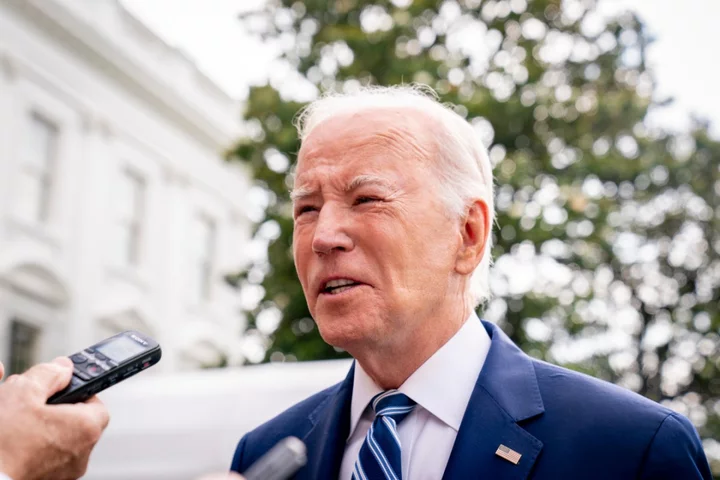
White House reveals Biden uses CPAP machine for sleep apnea after president seen with marks on his face
Joe Biden suffers from sleep apnea, and has begun use of a medicial CPAP device at night to treat the condition, the White House said on Wednesday. Sleep apnea, which is a relatively common sleep disorder, refers to the condition that inhibits oxygen intake during sleep, often causing snoring. A CPAP (continuous positive airway pressure) device is sometimes used in more aggressive cases to ensure proper oxygen flow overnight. The president’s press team made the revelation shortly after reporters noticed a set of indentations on Mr Biden’s face as he spoke to the press line — the indentations were a residual souvenir of the mask worn over one’s face while sleeping during use of a CPAP device. “Since 2008, the president has disclosed his history with sleep apnea in thorough medical reports. He used a CPAP machine last night, which is common for people with that history,” a White House spokesman said on Wednesday. Though many of the president’s supporters chafed at media reports disclosing the president’s use of the device, it’s commonly accepted that any medical condition which affects the US commander-in-chief takes on an importance which other politicians are often spared. Though sleep apnea is not a condition which could reasonably be considered likely to affect the presidency in any way, Mr Biden’s use of the device was nevertheless instantly picked up on by experts who were eager for a presidential light to be shown on sleep disorders. In fact, the White House’s statement only shortly followed an educated guess floated by the National Sleep Foundation, which this morning blasted out a press release to DC-area reporters in which a medical expert on sleep hypothesised that Mr Biden had CPAP-device indentations on his face. "It looks like the sort of indentation one would expect from a CPAP mask. If you look at photos of popular CPAP mask styles you can see how the strap would leave a similar mark as the one we see on President Biden. Sleep apnea is very common and the risk increases with age. As the oldest U.S. President ever, it would not be surprising if President Biden was being treated for sleep apnea,” said Dr Joseph Krainin, a sleep expert with SleepApnea.org and the National Sleep Foundation. Dr Krainin added: “We also know that President Biden has a history of a ruptured brain aneurysm which could predispose him to a certain type of sleep apnea where his brain forgets to breath during sleep." Mr Biden’s health has been closely watched by reporters since he took office in 2021, and with particularly renewed interest in 2023 following the official launch of his 2024 campaign for reelection. The president has attended a handful of campaign events since that announcement so far, but is due to see that ramp up as the election nears. In 2020, Mr Biden won election to office following a campaign season where many events changed from live to virtual venues as a result of the Covid-19 pandemic. Read More ‘Any Republican not named Trump’: Paul Ryan says former president is only candidate who would lose to Biden What next for Biden’s billion dollar broadband expansion? Kevin McCarthy knows he crossed the line with Donald Trump Biden touts his economic record in fiery speech: ‘Guess what – Bidenomics is working’ US public debt is projected to reach 181% of American economic activity in 30 years Biden urged to declare climate emergency as millions under heat wave warnings and air quality alerts — live
2023-06-29 07:47
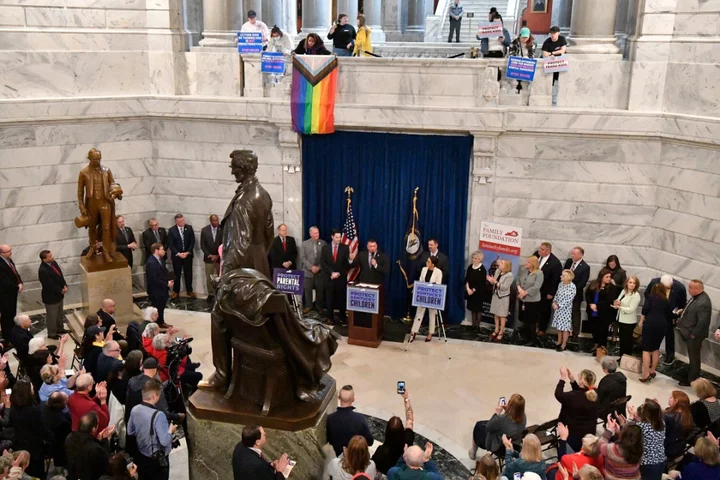
Federal judge blocks Kentucky’s ban on gender-affirming care for trans youth
A federal judge in Kentucky has issued a preliminary injunction that partially blocks a sweeping state law banning gender-affirming healthcare for transgender youth, joining several other federal court decisions that have temporarily blocked or struck down a wave of similar laws. The decision from US District Judge David J Hale on 28 June – one day before the law was set to go into effect – follows a legal challenge from a group of seven trans children and their families arguing that the law unconstitutionally singles out trans kids from the healthcare they can receive. They also argued that the law unconstitutionally restricts a parent’s right to make medical decisions for their children. Senate Bill 150 prohibits doctors from providing hormone therapies and puberty blockers to trans minors – treatments that Judge Hale notes “are medically appropriate and necessary for some transgender children under the evidence-based standard of care accepted by all major medical organizations in the United States.” “These drugs have a long history of safe use in minors for various conditions. It is undisputed that puberty-blockers and hormones are not given to prepubertal children with gender dysphoria,” he wrote. Shannon Minter, legal director of the National Center for Lesbian Rights, said the decision is a “huge relief” for the families at the centre of the lawsuit. “We are grateful that the court carefully considered all of the evidence and recognized that there is no support for this dangerous and unprecedented law,” she added. The law, denounced as one of the most far-reaching state-level measures targeting LGBT+ people amid an explosion of similar proposals across the US, was initially struck down by Democratic Governor Andy Beshear. A week later, lawmakers in the state’s Republican-controlled legislature voted to override his veto. The law also determines which bathrooms and locker rooms students can use and prohibits students from using pronouns and names other than those assigned at birth. It also prohibits discussion of sexual orientation and gender identity in schools, adopting elements of what critics have called “Don’t Say Gay” language introduced in similar legislation across the US. Those elements of the law are preserved; the lawsuit solely focused on provisions of the law impacting healthcare. State senator Karen Berg – whose trans son died by suicide weeks before this year’s legislative session – drove opposition to the bill over the last several months. During legislative debate, she denounced the “absolute willful, intentional hate for a small group of people, who are the weakest and the most vulnerable among us.” By the end of May, state lawmakers this year had introduced more than 500 bills impacting LGBT+ people, including 220 bills specifically targeting trans and nonbinary Americans, according to an analysis from the Human Rights Campaign. More than a dozen states have enacted laws or policies banning affirming healthcare for young trans people. But federal judges in several states have struck down or temporarily blocked similar laws with a series of rulings that refute evidence from Republican officials and their arguments against widely accepted medical guidance. Last week, a federal judge in Arkansas permanently struck down the state’s first-in-the-nation ban on gender-affirming care for trans youth, finding that the law violates the constitutional rights of trans patients, their families and health providers. Read More She lost her transgender son to suicide. She isn’t giving up fighting for him Transgender teen defends trans rights in Senate testimony: ‘These are human rights hanging in the balance’
2023-06-29 06:00
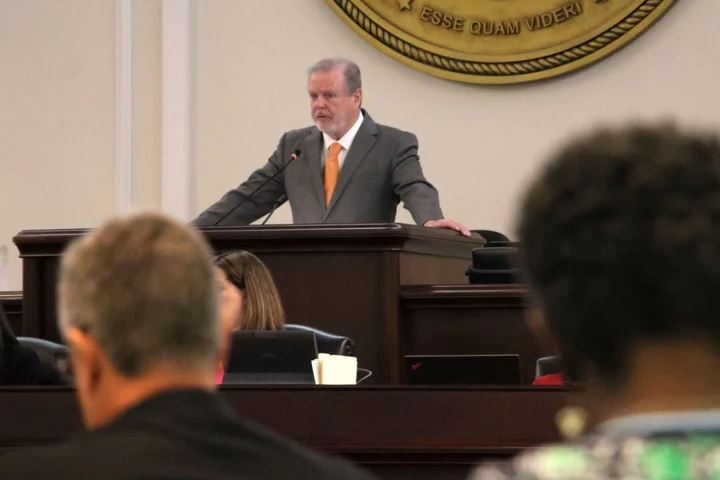
North Carolina lawmakers passed 12-week abortion ban. Now they want to make last-minute changes
The Republican-controlled North Carolina General Assembly made several last-minute changes to the 12-week abortion ban it passed earlier this year in an effort to stave off a legal challenge. The state’s abortion ban, which is set to take effect on 1 July, is being challenged in court. That lawsuit, attorneys said, was the main factor behind the Republican majority’s decision to introduce an amendment to an unrelated Department of Health and Human Services (DHHS) bill that effectively amends the abortion ban. ”The General Assembly is working to pass and enact, with or without the Governor’s signature, a technical and conforming bill to make changes to clarify and address most, if not all, aspects of Plaintiffs’ claims about the Act,” W Ellis Boyle, an attorney for House Speaker Tim Moore and Senate Leader Phil Berger, wrote in a legal filing on Tuesday. The amendment to the DHHS bill, House Bill 190, directly addresses a number of the concerns outlined in the lawsuit filed by Planned Parenthood of the South Atlantic and a number of other organisations. For instance, the lawsuit argues that a provision of the abortion ban stating that it is illegal “after the twelfth week of a woman’s pregnancy to advise, procure, or cause a miscarriage or abortion” violates the Constitution by preventing people from legally providing information about how a person could get legal abortion care in another state. In response, the amendment to HB 190 removes the word “advise” from the text of the abortion ban. The amendment also seeks to clean up a section on the regulation of medication abortion — which is banned after 10 weeks, not 12 — by deleting language that physicians prescribing medication abortions would have to verify that a pregnancy is no more than “70 days” old. Backers of the lawsuit, who are seeking a Temporary Restraining Order to prevent the abortion ban from taking effect on 1 July, do not believe that the changes to the ban proposed amendment to HB 190 go so far as to eliminate the need for the restraining order. “If those amendments are passed, they may remedy some of the constitutional violations that Plaintiffs allege,” North Carolina attorney general Josh Stein, nominally the defendant in the suit, wrote in a court filing reported by CNN. “But unless and until the current law is repealed or significantly amended, immediate injunctive relief is necessary to avoid a due-process violation.” Mr Stein, a Democrat, has said he does not intend to defend parts of the abortion ban his office believes are unconstitutional. Mr Stein wrote that even if the amendments pass, they would still “fail to make clear that doctors in North Carolina can help their patients obtain abortions out of state.” It is not yet clear whether Gov Roy Cooper, also a Democrat, intends to sign HB 190 or not. Mr Cooper vetoed the abortion ban, but saw his veto overriden by Republican supermajorities in the legislature. The fact that North Carolina is in the position of dealing with a 12-week abortion ban at all is a surprise: when the legislative session started, the Republicans did not have the votes needed to override a veto of an abotion bill. That changed, however, when Rep Tricia Cotham — a Democrat representing a heavily Democratic seat in the Charlotte area — suddenly switched her party affiliation and gave the Republicans the final vote needed to override Mr Cooper’s veto. Read More North Carolina Republicans censure Sen Thom Tillis for backing LGBT+ rights One year after Roe v Wade fell, anti-abortion laws threaten millions. The battle for access is far from over
2023-06-29 02:58

Trump news – live: Trump rails against ‘villains’ as he is named ‘Man of the Decade’ at Michigan GOP dinner
Donald Trump railed against a list of “villains” including electric vehicles (EVs), President Joe Biden and “radical left lunatics” as he delivered a speech in the battleground state of Michigan on Sunday night. The former president spoke before 2,500 supporters at Oakland County GOP’s Lincoln Day Dinner, where he was honoured by the party as its “Man of the Decade”. During the event, he claimed that electric vehicles would result in the “decimation” of the state’s traditional auto industry and claimed that his criminal indictments are “bulls***”. Michigan could be a key focus of the 2024 race after Mr Trump won the state in 2016 but lost it to Mr Biden in 2020. His appearance came one day after he told a crowd of evangelicals on Saturday that the federal government has a “vital role” in the restriction of abortion access and once again took credit for overturning Roe v Wade. But the former president did not detail his proposal for national abortion restrictions at the Faith & Freedom Coalition conference in Washington DC, in contrast to his 2024 rival Mike Pence, who said he supports outlawing care nationally at 15 weeks of pregnancy. Read More Trump celebrates anniversary of anti-abortion ruling as he tells religious crowd ‘I’m getting indicted for you’ Trump declares himself the ‘most pro-life’ president in American history Biden warns Republicans aren’t done with abortion bans as protesters hit streets on anniversary of Roe’s fall Trump quietly changes political fundraising site to funnel funds toward legal woes
2023-06-26 17:28

Trump tells Michigan Republicans that EVs will ‘decimate’ state’s auto industry
Donald Trump told an audience of MichiganRepublicans that the push for electric vehicles will mean the “decimation” of the state’s traditional auto industry. The former president made the comments as he appeared at the Oakland County Republican Party’s Lincoln Day dinner on Sunday night, his first appearance in the battleground state in the 2024 cycle. “It’s going to be a level that people can’t even imagine,” Mr Trump said during his address inside the Suburban Collection Showplace, in Novi, Michigan. Mr Trump told the crowd that the “maniacal push” for electric vehicles would kill auto jobs in the United States, and mocked the range of the vehicles, saying that they were a win for “tow truck companies.” “If somebody wants an electric car, I’m all for it. But you should be able to have a choice,” Mr Trump told the crowd. The event came the day after he told a crowd of evangelicals on Saturday that the federal government has a “vital role” in the restriction of abortion access while he once again took credit for overturning Roe v Wade. But the former president did not detail his proposal for national abortion restrictions, in contrast to his 2024 rival Mike Pence, who supports outlawing care nationally at 15 weeks of pregnancy. Mr Trump’s remarks to a Faith & Freedom Coalition conference in Washington DC came on the one-year anniversary of the US Supreme Court’s decision to revoke constitutional protections for abortion. Though he has repeatedly taken credit for the ruling, he has avoided questions about whether he would back a national ban if Republican lawmakers managed to pass one through Congress. Read More Trump news – live: Trump makes first 2024 campaign visit to battleground state of Michigan Republicans try to thread the needle on abortion on anniversary of the death of Roe Trump quietly changes political fundraising site to funnel funds toward legal woes Trump celebrates anniversary of anti-abortion ruling as he tells religious crowd ‘I’m getting indicted for you’ Trump is returning to Michigan with hopes of repeating the battleground success he found in 2016
2023-06-26 11:21

Biden warns Republicans aren’t done with abortion bans as protesters hit streets on anniversary of Roe’s fall
One year after the US Supreme Court revoked a constitutional right to abortion care, President Joe Biden warned Americans about Republican plans for a national ban and threats to contraception and birth control. The Supreme Court’s conservative majority decision to overturn Roe v Wade triggered a wave of anti-abortion laws across the US. More than a dozen states, mostly in the South, have effectively outlawed most or all abortions with few, if any, exceptions. Women’s March organisers and abortion rights advocacy groups rallied thousands of Americans in dozens of demonstrations held in cities across the US, hoping to build political momentum to combat anti-abortion candidates and secure federal protections for abortion care in 2024. Demonstrators in Washington DC marched to the Supreme Court. Marches for abortion rights have also joined Pride parades and Pride events, linking the fight for reproductive healthcare as part of a broader threat to civil liberties. “Extreme and dangerous abortion bans” across the US “put the health and lives of women in jeopardy, force women to travel hundreds of miles for care, and threaten to criminalize doctors for providing the health care that their patients need and that they are trained to provide,” Mr Biden said in a statement on Saturday. State bans are “just the beginning,” he added. In a speech to abortion rights’ advocates in North Carolina on Saturday, Vice President Kamala Harris said anti-abortion laws have sparked a healthcare crisis and “chaos, confusion and fear” among providers and pregnant patients – an agenda that “extremist” anti-abortion lawmakers plan to take national, she said. After the decision in Dobbs v Jackson Women’s Health Organization last year, Republicans have said that the Supreme Court ruling merely left abortion restrictions up to states. But anti-abortion lawmakers, and candidates for the 2024 Republican presidential nomination, are pushing for a national ban that would also strike down state laws that protect and expand abortion access. Congressional Republicans have passed several anti-abortion measures with national implications, and third-ranking House Republican Elise Stefanik has signalled that the party is preparing to introduce a ban on abortion at 15 weeks of pregnancy. Candidates vying for the Republican nomination for president in 2024 are mulling their proposals for national bans. Former vice president Mike Pence and South Carolina Senator Tim Scott have pledged support for a 15-week ban. Florida Governor Ron DeSantis has outlawed abortion in his state at six weeks of pregnancy, before many women know they are pregnant. Donald Trump, who has suggested that his main rival went too far with a six-week ban, also blamed Republicans’ poor outcomes in 2022 midterm elections on their anti-abortion platforms. In moves over the last year that have tested the limits of his presidency, Mr Biden issued a series of executive actions and memorandums to federal agencies to affirm access to abortion drugs and reproductive healthcare. The US Department of Justice also joined state and federal legal challenges to protect abortion access. Mr Biden’s latest order directs federal agencies to find ways to ensure and expand access to birth control. Congressional Republicans have refused to back Democratic bills that would codify the right to contraception. In Nevada, the state’s Republican governor, Joe Lombardo, recently vetoed legislation that would guarantee a right to contraception access, a move that abortion rights advocates fear is a sign of similar actions to come. Republican officials are also supporting the legal battle from anti-abortion activists to revoke the federal government’s approval of a widely-used abortion drug. That case is expected to land before the Supreme Court, where justices could deliver yet another ruling with massive consequences for abortion care. “Congressional Republicans want to ban abortion nationwide, but go beyond that, by taking FDA-approved medication for terminating a pregnancy, off the market, and make it harder to obtain contraception,” Mr Biden said in his statement. “Their agenda is extreme, dangerous, and out-of-step with the vast majority of Americans.” More than 60 per cent of Americans disagree with the decision in Dobbs, according to polling from NBC News. That figure includes nearly 80 per cent of women aged 18-49; two-thirds of women who live in the suburbs; 60 per cent of independent voters; and one-third of all Republican voters. A record 69 per cent of Americans believe abortion should be legal within the first three months of pregnancy, according to a recent Gallup poll, marking an increase of at least 2 per cent in the last year. More than half of Americans believe abortion is morally acceptable – a 10 per cent increase since 2001. A separate poll from USA Today/Suffolk University found that one in four Americans say states’ efforts to restrict abortion access have made them more supportive of abortion rights. The Supreme Court’s decision to overturn Roe v Wade has also alarmed other civil rights groups who fear the conservative court could take aim at fundamental rights to privacy and constitutional rights to due process and equal protection under the law. In his concurring opinion, conservative Justice Clarence Thomas suggested that the court should “revisit” landmark cases involving the right to contraception, same-sex relationships and marriage equality. In remarks to abortion rights advocates on 23 June, Mr Biden said the Dobbs decision “risks the broader rights of privacy for everyone”. “That’s because the fundamental right to privacy, which Roe recognized, has served as a basis for so many other rights that are ingrained in the fabric of our country: the right to make the best decisions for your health, the right to use birth control,” Mr Biden added. “Did you ever think we’d be arguing about that?” He singled out the opinion from Justice Thomas. “These guys are serious, man. I said it when the decision came out, and people looked at me like I was exaggerating. But they’re not stopping here,” Mr Biden said. “Make no mistake, this election is about freedom on the ballot once again.” The president also pointed to victories for abortion rights in Kansas, Kentucky and Michigan in the wake of the Dobbs ruling. “I said at the time that I didn’t think the Court – or, for that matter, the Republican Party, who for decades have pushed their extreme agenda – have a clue about the power of women in America,” Mr Biden said in his remarks. “I said they were about to find out.” Read More One year after Roe v Wade fell, anti-abortion laws threaten millions. The battle for access is far from over The religious right used to be uneasy about Trump – but his dominance is now complete Mike Pence calls for 15-week abortion ban on eve of anniversary of Roe being overturned Anti-abortion laws harm patients facing dangerous and life-threatening complications, report finds Where abortion laws stand in every state a year after the Supreme Court overturned Roe Evangelical leader hopes conference is 'testosterone booster shot' for anti-abortion 2024 candidates
2023-06-25 02:45
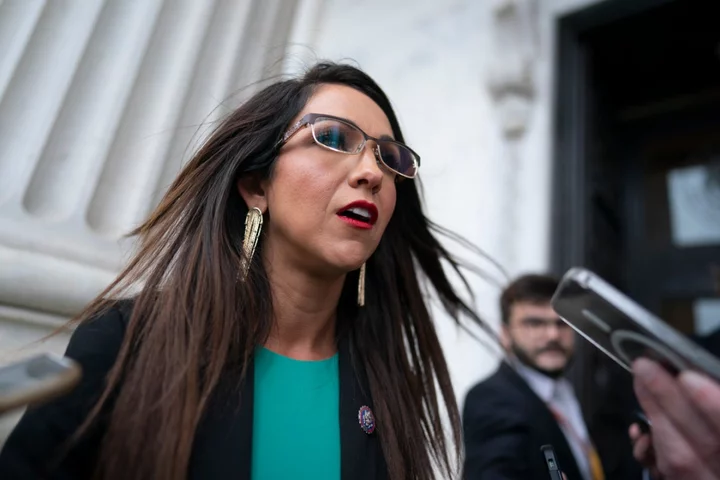
Lauren Boebert reveals she’s officially a grandmother as she avoids question about Marjorie Taylor Greene spat
Congresswoman Lauren Boebert has announced she has become a grandmother at the age of 36. Ms Boebert, who has insisted in the past that raising a child is cheaper than paying for birth control, made the announcement while dodging a question about her spat with congressional colleague Marjorie Taylor Greene. Ms Greene called Ms Boebert a "little b****" on the House floor during a spat. Ms Boebert sat down for an interview with Sean Hannity the next day during which he asked about the feud. That's when Ms Boebert revealed she became a grandmother. "Sean, I did not put my life on pause and leave my four boys and my now grandson to come here and just get in spats with people," she told the host. "I came here to legislate and to be effective for Coloradans, Coloradans who are suffering from the Democrats’ policy. Marjorie is not my enemy. Joe Biden’s policy, the Democrats, that is my enemy that I am combating right now." The new grandchild belongs to her 17-year-old son Tyler. Ms Boebert first announced that her child was having a child in April. “So I’m going to tell you all for the first time in a public setting, that not only am I a mom of four boys, but come April I will be a gigi to a brand new grandson. And Jason and I are so excited to welcome this new life into our family,” she told the crowd at a Moms for America event. She told the same crowd that there was “something special” about rural communities because their teen moms did not abort pregnancies as often as urban teenagers did. Data from the US Centres for Diease Control and Prevention shows that teenage mothers are less likely to finish high school than their childless counterparts. Ms Boebert is a living example of that statistic; she dropped out of high school in 2004 when she became pregnant. She only finished her GED in 2020 a month before her first primary contest during her congressional race. “Now my son when I approached him and told him, ‘Tyler, I’m going to be a 36-year-old grandmother.’ He said, ‘well didn’t you make granny a 36-year-old granny,’” Ms Boebert said during the Moms for America event. “I said, ‘Yes, I did.’ He said, ‘Well then it’s hereditary.’” She told the audience that she was proud of her son’s partner for not seeking an abortion. Read More Lauren Boebert accuses Marjorie Taylor Greene of spitting on her lip after being called ‘a little b****’ GOP's Boebert wanted to impeach Biden, but House Speaker McCarthy had other plans AOC implores Greene and Boebert to not waste time with Biden impeachment: ‘We should actually be working’ AP News Digest 3:20 am GOP's Boebert wanted to impeach Biden, but House Speaker McCarthy had other plans Marjorie Taylor Greene calls Lauren Boebert a ‘little b****’ on House floor
2023-06-24 01:24

Malawi Establishes Agency to Oversee Trade, Marketing of Carbon Credits
Malawi has created an agency to oversee its trade and marketing of carbon emission offsets, President Lazarus Chakwera
2023-06-24 00:22

El Nino’s Fierce Heat Carries New Risk of Resurgent Deadly Viruses
The return of El Niño after nearly four years is raising the specter of extreme weather, economic pain,
2023-06-23 12:50

Supreme Court rules against Navajo Nation’s access to drought-stricken Colorado River, despite US treaty
The Supreme Court ruled on Thursday against the Navajo Nation in a dispute concerning the tribe’s access to the drought-stricken Colorado River. Critics says the decision harms a community where an estimated one-third of tribal members lack running water and furthers the history of the US government breaking its promises to tribes. The case, Arizona v Navajo Nation, centres on the obligations of an 1868 treaty, which established the Navajo reservation as the tribe’s permanent home, following their forced removal from their ancestral lands by the United States military. The tribe argued that under the treaty, the US government has an obligation to evaluate the tribe’s need for water and factor that analysis into how it divides up water access to the Colorado River, which serves over 40 million people and passes through seven states. The US government, as well as the states of Arizona, Nevada, and Colorado, and various water districts in California, argued against the tribe in consolidated appeals. They claimed that the tribe’s interpretation of the treaty would undermine existing agreements on sharing the water from the Colorado and create and impose unsubstantiated obligations on the US government to develop water infrastructure for the tribe. In a 5-to-4 decision, all but one of the high court’s conservatives ruled against the tribe. “In light of the treaty’s text and history, we conclude that the treaty does not require the United States to take those affirmative steps,” Justice Brett Kavanaugh wrote in the majority opinion. “And it is not the Judiciary’s role to rewrite and update this 155-year-old treaty. Rather, Congress and the President may enact — and often have enacted — laws to assist the citizens of the western United States, including the Navajos, with their water needs.” The court’s three liberal justices, as well as the Trump-appointed Neil Gorsuch, an advocate for tribal rights, dissented. “The Navajo have waited patiently for someone, anyone, to help them, only to be told (repeatedly) that they have been standing in the wrong line and must try another,” he wrote in his dissenting opinion. He argued, alongside the tribe, that the Navajo weren’t forcing the US government to immediately start building water infrastructure or changing water claims on the river, but rather begin the process of fully accounting for what the nation needed. Navajo representatives criticised the ruling. "My job as the president of the Navajo Nation is to represent and protect the Navajo people, our land, and our future,” Navajo Nation president Buu Nygren said in a statement after the ruling. “The only way to do that is with secure, quantified water rights to the Lower Basin of the Colorado River.” With a population of about 175,000 and a land mass larger than West Virginia, the Navajo Nation is the largest US tribal reservation, and the Colorado River and its tributaries flow alongside and through the tribe’s territory. “The US government excluded Navajo tribal citizens from receiving a share of water when the original apportioning occurred and today’s Supreme Court decision for Arizona v. Navajo Nation condoned this lack of accountability,” John Echohawk, executive director of the Native American Rights Fund, one of the many Indigenous groups that filed briefs in support of the Navajo Nation, said in a statement. “Despite today’s ruling, Tribal Nations will continue to assert their water rights and NARF remains committed to that fight.” In 2003, the Navajos sued the federal government regarding access to the Colorado River, while the tribe has also fought for access to a tributary, the Little Colorado River, in state court. As The Independent has reported, many on the Navajo nation struggle for basic water access. “If you run out [of water] in the evening, you have to get up earlier the next day to make sure that there’s water for the kids to wash hands, brush their teeth, make breakfast,” Tina Becenti told The Independent. “It was time-consuming and took a lot of energy.” Tribes were cut out of initial deals made to allocate the water on the Colorado River, leaving many to rely on thousands of unregulated wells, springs, and livestock troughs that are spread across the reservation, which can pose a serious health risk. According to the Environmental Protection Agency, these sources may contain bacterial or fecal contaminants, along with unsafe levels of uranium and arsenic – a legacy of mining on Navajo land which began with the US military’s Manhattan Project for nuclear weapons in 1944 and continued until 2005. The fate of the Colorado River has become increasingly contentious, as the vital waterway dwindles under heavy demand and a changing climate. In May, following years of tense negotiations, Arizona, California, and Nevada agreed to cut their use of water from the Colorado in exchange for $1.2bn in federal funding, a last-minute compromise that staved off catastrophic impacts to agriculture, electricity generation, and water supplies to major cities like Phoenix and Los Angeles. The high court decision follows a ruling this month on another topic with a long and complicated history involving tribal groups: adoption. Last week, a 7-2 majority ruled to preserve the Indian Child Welfare Act, defending the law’s preference for the foster care and adoption of Native children by their relatives and Tribes, which was implemented following investigations that revealed more than one-third of Native children were being removed from their homes and placed with non-Native families and institutions, cutting off important family and cultural ties. Louise Boyle and Alex Woodward contributed reporting to this story. Read More Father of 13 dies in Colorado rafting accident after saving his children from danger Feds announce start of public process to reshape key rules on Colorado River water use by 2027 Nevada fight over leaky irrigation canal and groundwater more complicated than appears on surface Supreme Court rules against Navajo Nation in Colorado River water rights case Feds announce start of public process to reshape key rules on Colorado River water use by 2027 Vegas water agency empowered to limit home water flows in future
2023-06-23 09:21
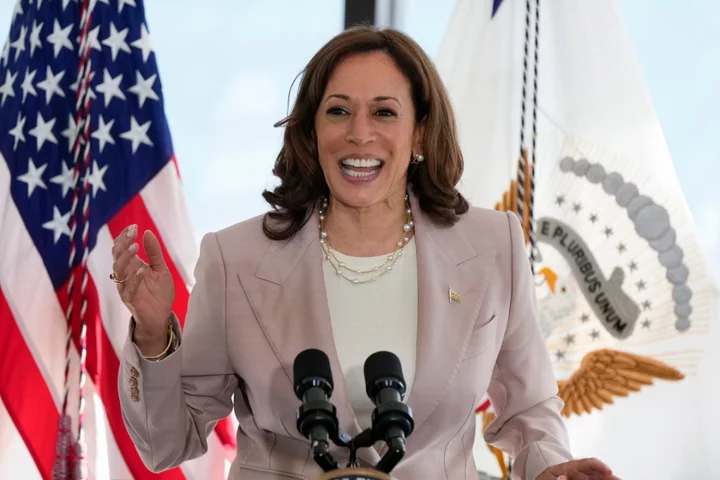
Kamala Harris says goddaughter’s friends are choosing college towns on abortion legalisation
Vice President Kamala Harris has said she knows of young people choosing which college they want to attend based on how restrictive the abortion laws are in that state. Commenting in an interview for the Roe v Wade retrospective on MSNBC’s The ReidOut, Ms Harris said her goddaughter told her that her friends wanted to attend schools in states where there was more freedom in terms of reproductive rights. Ms Harris told the roundtable: “When the decision came down she told me ‘Do you know what’s happening? My friends – whatever gender – are starting to make decisions about where they will actually go to college depending on what’s happening in that state.’” “Because of course, if you look at it, I think the number is something like 23 million women of reproductive age live in states that have banned abortion, and what that is gonna mean for those 23 million, for the myriad of health care issues that are at stake ... It’s having a real impact on all types of decisions people make,” she added. The show took a look back at the decision to overturn the landmark Roe v Wade decision that legalised abortion in the US in 1973 when the Supreme Court ruled that “unduly restrictive state regulation of abortion is unconstitutional”. In 2022, the Supreme Court, packed with three Trump-era appointees, overturned Roe v Wade and returned decisions on abortion freedom to the states. Since then, a number of states have introduced effective abortion bans that limit the procedure to the very early days of pregnancy – often before women are aware they are pregnant. Some states have also criminalised assisting women with accessing abortion, and limited abortion to cases of rape or incest. Ms Harris said that the Supreme Court’s decision last year had infringed on women’s rights. “The idea that the highest court in our land just did that and rolled back rights that had been recognized was incredibly shocking,” she said on MSNBC. She said that after she learned the news of the ruling, she called her husband and shared some “words not meant for television at this moment”. Ms Harris went on to say that the ruling means that some have to “suffer in silence,” the thought of which made her “angry and sad”. Read More Where abortion laws stand in every state a year after the Supreme Court overturned Roe A year after fall of Roe, 25 million women live in states with abortion bans or tighter restrictions Judge to weigh suspending Wyoming's first-in-the-nation ban on abortion pills US prepares for potential end of Roe v Wade - live When will there be a Roe v Wade decision? Why these prosecutors are refusing to enforce anti-abortion laws
2023-06-22 23:59

Burkina Faso media guide
An overview of the media in Burkina Faso, including links to newspapers and broadcasters.
2023-06-21 19:55
